Root Canal Treatment Weatherford
Removing the Infection to Ensure Better Oral Health
If a toothache is keeping you awake at night, it might be caused by an infection deep within your pulp. To save your tooth and stop your pain, we might recommend root canal treatment in Weatherford. The endodontic procedure removes the inner layer of your tooth, saving it from extraction. Although they have a bad reputation for being painful, they often aren’t any worse than a traditional filling thanks to the latest innovations in dentistry. We’ll go out of our way to make sure that your root canal is as comfortable as possible while preserving your tooth, so call our dental office today.
Why Choose Cosmetic & Family Dentistry of Weatherford for Root Canal Treatment?
- State-of-the-Art Facility & Technologies
- Dental Insurance Welcome
- Sedation Dentistry Available
What Is a Root Canal?
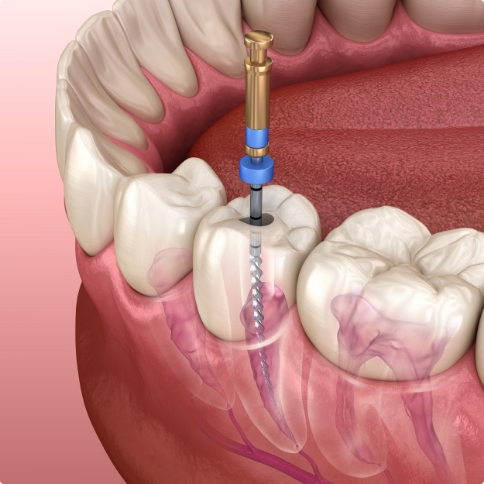
If you could look inside your tooth, you’d see a chamber that runs from root tip to root tip. Through the chamber runs a tissue called the pulp, which feeds the tooth and relays nerve impulses to keep you aware of how the tooth is doing. When the chamber becomes exposed to decay or injury, it can damage or infect the pulp. If this occurs, the pulp must be extracted to save the tooth and stop the pain.
Do I Need a Root Canal?
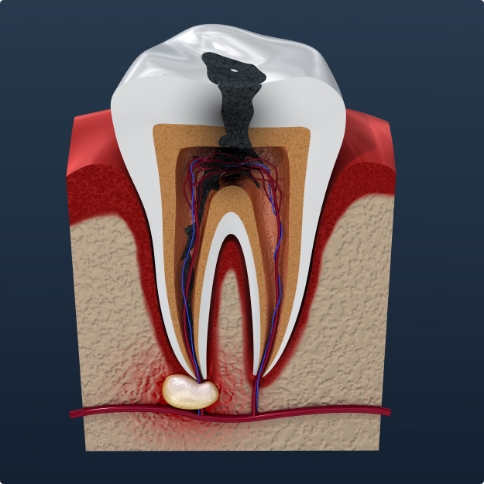
There are several indicators that a root canal may be in your future, such as:
- Darkening of the tooth
- Lingering sensitivity to hot or cold temperatures
- Pimple-like bump appearing near the gumline
- Toothache
- Pain when placing pressure on the tooth
What Can I Expect During a Root Canal?
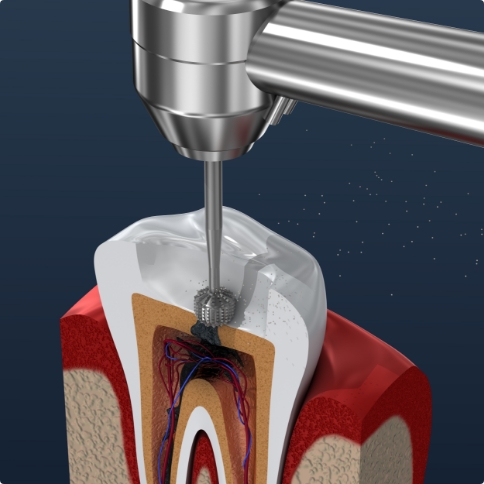
After an initial consultation to ensure a root canal is in your best interest, you’re scheduled for your procedure. We’ll use an anesthetic to ensure your comfort as we open your tooth and remove any areas of decay or damage. We’ll extract the pulp before sterilizing the tooth and sealing it with a special material called gutta-percha.
Now that the health of your tooth has been restored, it’s time to preserve its integrity. A custom-made dental crown is bonded over the entire surface of the tooth visible above the gumline. This protects your tooth from additional damage while also reinstating its function and appearance.
Is It Better to Have the Tooth Extracted?
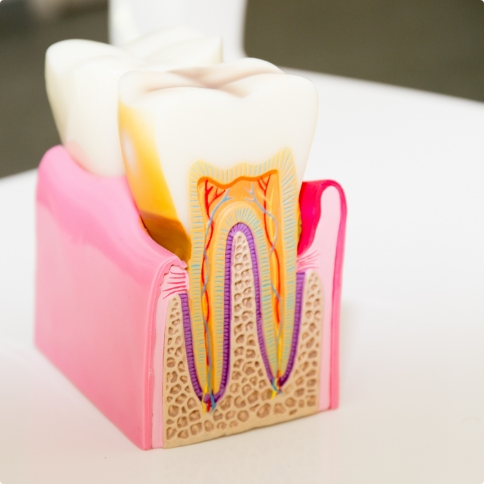
Extracting a problematic tooth eliminates the issue, but it opens the door to a new list of complications. Every tooth is essential to a healthy, functional smile. When even one is missing, it increases your risk of tooth decay, gum disease, and additional missing teeth. Instead, it’s better to save your tooth with a root canal.
Understanding the Cost of Root Canals
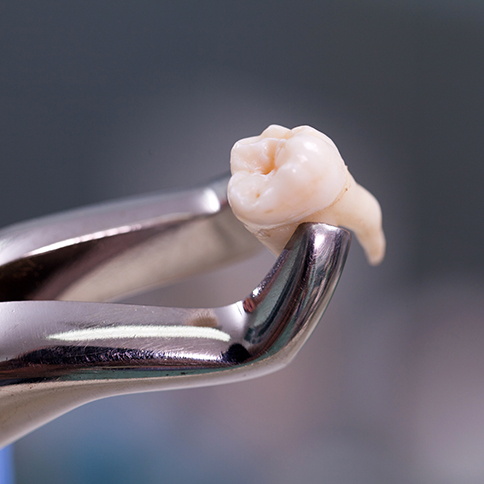
Are you in need of root canal treatment? While you might understand how this procedure can save a tooth, you’re likely wondering how much it’ll cost. Since the price is based on your specific treatment plan, you won’t expect to find a set fee. Our team will provide you with an estimate during your initial consultation and discuss your payment options, like using your dental insurance. We can also work on your behalf with your insurance carrier to maximize your benefits to lower your out-of-pocket expenses. Read on to learn more about the cost of a root canal in Weatherford!
Factors That Can Affect Root Canal Cost
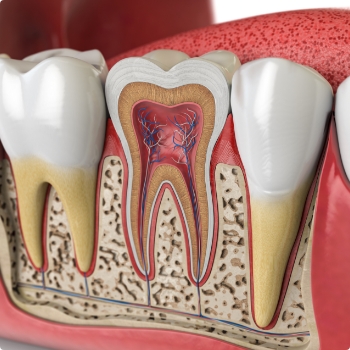
The best way to determine the exact price range of your root canal is for our team to examine your dental situation. Numerous factors can significantly influence the overall cost, including:
- The type and location of the tooth: If you have a damaged molar, then you might expect your treatment to cost more than if it was a front tooth. This is because molars have more roots to account for.
- The complexity of your case: Depending on the amount of difficulty, a specialist may need to be brought in for your procedure, which can increase the price.
- Other essential dental treatments: Once your root canal is completed, you may require a custom-made restoration like a dental crown, increasing how much you end up paying.
Is It Cheaper to Pull My Tooth?

Extracting a problematic tooth eliminates the issue, but it opens the door to a new list of complications. Every tooth is essential to a healthy and functional smile. When even one is missing, it increases your risk of tooth decay, gum disease, and further tooth loss.
You may be able to avoid these complications by restoring your smile with a dental bridge or implant. However, these procedures can cost you more money both upfront and in the long run compared to a root canal. For this reason, it’s better to save your tooth ahead of time, that way you prevent the likelihood of needing an extraction in the future.
Does Dental Insurance Cover Root Canal Treatment?

Since root canal treatment is considered a major dental procedure, most dental insurance companies provide plans to cover anywhere from 50-80% of the cost of your treatment. However, every policy is different, so you’ll need to confirm the details of your plan with your provider before committing to any treatment. Fortunately, our knowledgeable staff is more than happy to help you navigate your dental insurance so that you can make the most of your benefits!
Other Options for Making Root Canal Treatment Affordable

Even if you don’t currently have dental insurance, it doesn’t mean you’ll be left completely on your own. Our practice offers alternative financing options through CareCredit that can help split up the sum of your treatment cost into smaller monthly installments. Many of these plans also come with zero upfront expenses and little-to-no interest! You’ll be able to make the cost of your root canal more affordable for a stress-free experience.
Root Canal FAQs
Why Do I Need a Root Canal If My Tooth Doesn’t Hurt?
Intense tooth pain often leads people to their dentist’s office only to discover they need a root canal. However, just because you don’t feel any tooth pain doesn’t mean that everything is fine. Your tooth’s nerves may have “died” due to trauma or infection without first feeling any discomfort, and so your tooth is no longer capable of feeling pain. Biannual dental exams are crucial to allow your dentist in Weatherford to check for any signs of trouble that you may not have noticed.
How Long Do Root Canals Take?
Although root canal treatment can usually be completed in one appointment, it may sometimes require two sessions. During your first visit, our dentist will place a temporary antibacterial medicine inside the tooth to relieve your pain. Then, you’ll return to the office at a later date to have the inside of your tooth cleaned out. In most cases, the procedure will take 30-90 minutes. Of course, the amount of time varies depending on the location of the tooth. Molars have more root canals that must be disinfected than front teeth, so root canal therapy for back teeth usually takes more time.
Are Root Canals Safe?
Faulty research conducted almost a century ago led to persistent rumors claiming root canals are unsafe and increase your risk of various medical conditions. However, the American Association of Endodontists (AAE) has thoroughly debunked this idea. Root canal treatment performed by a qualified dentist is quite safe with a success rate of about 95 percent. As with any medical procedure, there is a very small chance of some bacteria remaining in the tooth after a root canal and causing reinfection. It’s important to play it safe, so be sure to let your dentist know if you experience intense swelling, pain, or fever in the days after your root canal.
How Long Does It Take to Recover from a Root Canal?
Even though the recovery time is different for everyone, most patients can return to their usual activities the day after their root canal. Keep in mind that strenuous exercise can divert blood from the site and delay the healing process. That said, if your job requires physical labor, it’s best to take the next 2-3 days off. Your mouth will also feel sore in the first few days after your procedure. Fortunately, you can manage your discomfort by taking over-the-counter pain medication and using a cold compress. While you heal, make sure you avoid chewing on the side of your mouth where the root canal occurred.
How Much Pain is Normal After a Root Canal?
It should be emphasized that you don’t need to worry about pain during the root canal treatment itself because your mouth will be numbed. That being said, there may be some discomfort and soreness in the days following the root canal procedure.
Patients typically report mild levels of pain and sensitivity. Such symptoms should eventually go away on their own. In fact, you can usually expect the discomfort to begin subsiding after three days. Until then, it’s up to you to take whatever steps are needed to keep your mouth as comfortable as possible. This typically involves staying away from hard foods and taking an over-the-counter pain reliever such as ibuprofen.
If your discomfort lasts longer than expected or starts growing worse, something may have gone wrong. Please call our office immediately if you experience these types of unexpected symptoms.
Can I Eat Before a Root Canal?
The answer to this question depends on whether some form of sedation will be administered during your root canal treatment. If it will, then you’ll most likely need to avoid eating anything for at least a few hours before your procedure; otherwise, it could lead to nausea.
On the other hand, if you don’t plan on receiving dental sedation, then it could be beneficial to eat something about two hours prior to your appointment. Generally speaking, eating immediately after a root canal treatment is not a good idea. Your mouth will still be numbed, so you could easily end up biting your tongue or the inside of your cheek by accident.
Regardless of whether you will be sedated or not, you should definitely avoid consuming any alcohol for at least a full 24 hours prior to your root canal treatment. Alcohol can easily have a negative interaction with the local anesthetic administered at the beginning of the procedure.
Do I Need Antibiotics Before or After My Root Canal?
For most patients, the answer is no. Antibiotics will generally only be considered necessary if you have a higher-than-normal risk of developing an infection after a dental procedure due to an existing health issue. Our team will review your health history carefully in order to determine whether antibiotics are necessary in your case.
Do Root Canals Make You Sick?
No, the idea that root canal treatment can increase your risk of getting sick is a myth. The idea comes from improperly performed research in the 1920s, and it has been thoroughly debunked thanks to an improved understanding of what causes a variety of diseases.
Simply put, there’s no evidence that root canal treatment can lead to illness. If anything, avoiding a root canal treatment has a higher chance of making you sick due to the potential for harmful bacteria to start spreading to other areas of the body.
I Need a Checkup & Cleaning I Need Help with a Lip and/or Tongue-Tie I am Worried About Gum Disease I Have a Cavity or Broken Tooth I am Missing One or More Teeth I Want to Enhance My Smile I Want a Straighter Smile I Have Jaw Pain I am Scared of the Dentist I'm Having Trouble Sleeping I Have a Dental Emergency View Our Services
